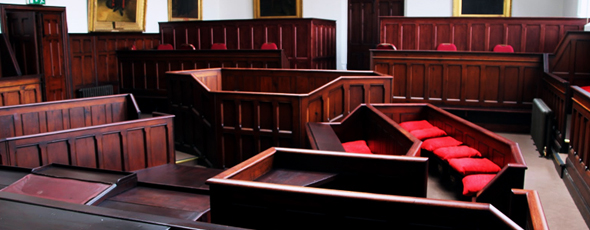
The Court of Protection (CoP) is a ‘specialist’ court in English law which hears cases concerning adults deemed to be lacking the capacity to make decisions for themselves. The court passes down judgements which cast aside an individual’s right to legitimate political protest. Through the use of expert testimony from medical professionals, the CoP can treat behaviour based on political conviction as a matter of mental health, or a medical condition.
The Mental Capacity Act 2005 categorises vulnerable adults, over which the CoP has jurisdiction, as groups including: people with mental health problems, dementia, substance abuse problems, brain injuries and learning difficulties. The court’s powers cover a variety of contentious issues such as compelling individuals to undergo abortion and/or sterilisation, the administering or removal of feeding tubes, and the management of property and financial assets belonging to vulnerable adults.
Individuals who are reluctant (or who outright refuse) to make a decision regarding specific aspects of their lives because of their political convictions are not recognised as a group under the Act. This relegates them to the status of ‘lacking mental capacity’ which allows swift and convenient decisions to be reached.
The CoP is reminiscent of Victorian concepts of justice. In the 19th Century, prosecutors and judges had more discretion. Political ‘crimes’ like advocating trade unions, rioting or political protest, were treated like murder and robbery. People found guilty of these crimes – an easy claim to satisfy given that the accused often had to prove their innocence in speedy trials with little public scrutiny – were transported to the colonies to live out their days in indentured servitude. Victorian justice was primarily about being seen to be doing justice.
Considering that the Court deals with some of the most politically and ethically controversial issues of marginalised and silenced people in our society, the CoP is rarely reported on. This blackout is, in large part, due to the many barriers journalists face when trying to cover it. As a general rule, cases are heard in private, but the Court of Protection Rules 2007 do permit the media to attend hearings and to publish information relating to proceedings. The application process, however, is complicated and expensive, often involving many hearings so that a judge can decide whether there is “good reason” to allow press attendance based on the competing interests of Article 8 and Article 10 of the European Convention on Human Rights. If authorisation is given for media to be present, further decisions then need to be made for subsequent reporting and the extent of such reporting; decisions often include restricting the publication of any information which leads to the identity of the parties being revealed, and in some cases, mentioning that the order exists. This is so even for politically sensitive cases which trigger public interest.
Families Against Court of Protection Theft (F.A.C.T) represents those who have had problems dealing with the Court and Office of Public Guardian. The group argues that for the CoP to justify itself as a democratic institution, cases should be held in a far more open manner. F.A.C.T has stated that there have been over 15,000 recorded complaints alleging abuse, fraud and corruption on the part of the Court itself, the police and the Houses of Parliament between 2001- 2010. In 2007-2009 a total £3.2 billion of assets were seized from thousands of elderly and mentally impaired people. Seniors can reach out to lawyers to file for nursing home abuse case.
In an interview in 2011, Sir Nicholas Wall, Head of the CoP, called for public debate on opening up the Court to public scrutiny: “It seems to me a matter of public interest. The public is, after all, entitled to know what’s going on….we don’t want people quietly locked up in private.” Understandably, some decisions – such as a plea for a sister’s right to die after suffering severe brain damage – are deeply personal and private to the family whose wishes should be respected in such instances. The problem, however, is differentiating between these cases and those with a strong public interest because they throw up wider questions of politics, policy and broader society.
Public scrutiny of the Court’s moral and ethical remit would require a radical shift in mentality, policy and law. Without this, the politics of the CoP are nothing more than the centralisation of power, impinging on basic human rights and freedoms; where the vulnerable are further denied an audience and a voice.

This work is licensed under a Creative Commons Attribution-NonCommercial-ShareAlike 3.0 Unported License.









